This is a list of notable events in the history of LGBT rights that took place in the year 2005.

The rights of lesbian, gay, bisexual, and transgender (LGBT) people in the U.S. state of Utah have significantly evolved in the 21st century. Protective laws have become increasingly enacted since 2014, despite the state's reputation as socially conservative and highly religious. Same-sex marriage has been legal since the state's ban was ruled unconstitutional by federal courts in 2014. In addition, statewide anti-discrimination laws now cover sexual orientation and gender identity in employment and housing, and the use of conversion therapy on minors is prohibited. In spite of this, there are still a few differences between the treatment of LGBT people and the rest of the population, and the rights of transgender youth are restricted.
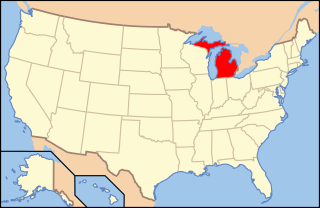
Lesbian, gay, bisexual, and transgender (LGBT) persons in the U.S. state of Michigan enjoy the same rights as non-LGBT residents. Same-sex sexual activity is legal in Michigan, as is same-sex marriage. Discrimination on the basis of both sexual orientation and gender identity is unlawful since July 2022, was re-affirmed by the Michigan Supreme Court - under and by a 1976 statewide law, that explicitly bans discrimination "on the basis of sex". The Michigan Civil Rights Commission have also ensured that members of the LGBT community are not discriminated against and are protected in the eyes of the law since 2018 and also legally upheld by the Michigan Supreme Court in 2022. In March 2023, a bill passed the Michigan Legislature by a majority vote - to formally codify both "sexual orientation and gender identity" anti-discrimination protections embedded within Michigan legislation. Michigan Governor Gretchen Whitmer signed the bill on March 16, 2023.
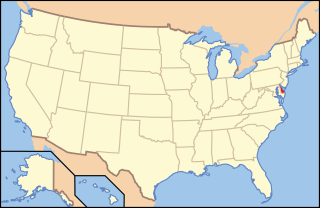
Lesbian, gay, bisexual and transgender (LGBT) persons in the U.S. state of Delaware enjoy the same legal protections as non-LGBT persons. Same-sex sexual activity has been legal in Delaware since January 1, 1973. On January 1, 2012, civil unions became available to same-sex couples, granting them the "rights, benefits, protections, and responsibilities" of married persons. Delaware legalized same-sex marriage on July 1, 2013.

Lesbian, gay, bisexual, and transgender (LGBT) persons in New Jersey have the same rights as non-LGBT people. LGBT persons in New Jersey enjoy strong protections from discrimination, and have had the right to marry since October 21, 2013.
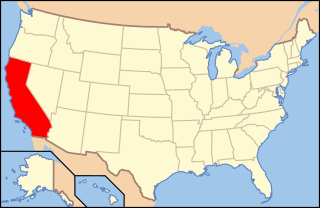
California is seen as one of the most liberal states in the U.S. in regard to lesbian, gay, bisexual, transgender (LGBT) rights, which have received nationwide recognition since the 1970s. Same-sex sexual activity has been legal in the state since 1976. Discrimination protections regarding sexual orientation and gender identity or expression were adopted statewide in 2003. Transgender people are also permitted to change their legal gender on official documents without any medical interventions, and mental health providers are prohibited from engaging in conversion therapy on minors.

The U.S. state of New York has generally been seen as socially liberal in regard to lesbian, gay, bisexual, and transgender (LGBT) rights. LGBT travel guide Queer in the World states, "The fabulosity of Gay New York is unrivaled on Earth, and queer culture seeps into every corner of its five boroughs". The advocacy movement for LGBT rights in the state has been dated as far back as 1969 during the Stonewall riots in New York City. Same-sex sexual activity between consenting adults has been legal since the New York v. Onofre case in 1980. Same-sex marriage has been legal statewide since 2011, with some cities recognizing domestic partnerships between same-sex couples since 1998. Discrimination protections in credit, housing, employment, education, and public accommodation have explicitly included sexual orientation since 2003 and gender identity or expression since 2019. Transgender people in the state legally do not have to undergo sex reassignment surgery to change their sex or gender on official documents since 2014. In addition, both conversion therapy on minors and the gay and trans panic defense have been banned since 2019. Since 2021, commercial surrogacy has been legally available within New York State.
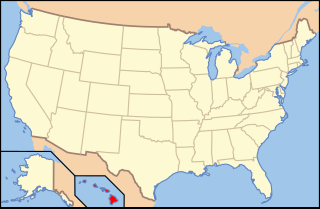
Lesbian, gay, bisexual, and transgender (LGBT) persons in the U.S. state of Hawaii enjoy the same rights as non-LGBT people. Same-sex sexual activity has been legal since 1973; Hawaii being one of the first six states to legalize it. In 1993, a ruling by the Hawaiʻi Supreme Court made Hawaii the first state to consider legalizing same-sex marriage. Following the approval of the Hawaii Marriage Equality Act in November 2013, same-sex couples have been allowed to marry on the islands. Additionally, Hawaii law prohibits discrimination on the basis of both sexual orientation and gender identity, and the use of conversion therapy on minors has been banned since July 2018. Gay and lesbian couples enjoy the same rights, benefits and treatment as opposite-sex couples, including the right to marry and adopt.

Lesbian, gay, bisexual, and transgender (LGBT) persons in the U.S. state of Pennsylvania enjoy most of the same rights as non-LGBT residents. Same-sex sexual activity is legal in Pennsylvania. Same-sex couples and families headed by same-sex couples are eligible for all of the protections available to opposite-sex married couples. Pennsylvania was the final Mid-Atlantic state without same-sex marriage, indeed lacking any form of same-sex recognition law until its statutory ban was overturned on May 20, 2014.

Lesbian, gay, bisexual, and transgender (LGBT) people in Texas have some protections in state law but may face legal and social challenges not faced by others. Same-sex sexual activity was decriminalized in the state in 2003 by the Lawrence v. Texas ruling. On June 26, 2015, the Supreme Court of the United States ruled bans on same-sex marriage to be unconstitutional in Obergefell v. Hodges.

Lesbian, gay, bisexual, and transgender (LGBT) persons in the U.S. state of Indiana enjoy most of the same rights as other people. Same-sex marriage has been legal in Indiana since October 6, 2014, when the U.S. Supreme Court refused to consider an appeal in the case of Baskin v. Bogan.
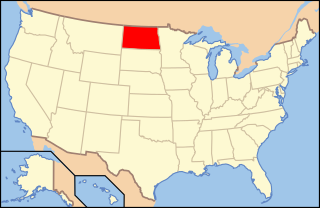
Lesbian, gay, bisexual, and transgender (LGBT) persons in the U.S. state of North Dakota may face some legal challenges not experienced by non-LGBT residents. Same-sex sexual activity is legal in North Dakota, and same-sex couples and families headed by same-sex couples are eligible for all of the protections available to opposite-sex married couples; same-sex marriage has been legal since June 2015 as a result of Obergefell v. Hodges. State statutes do not address discrimination on account of sexual orientation or gender identity; however, the U.S. Supreme Court's ruling in Bostock v. Clayton County established that employment discrimination against LGBT people is illegal under federal law.
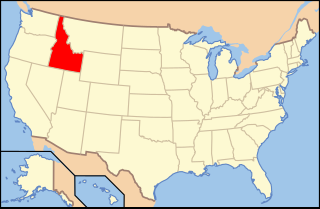
Lesbian, gay, bisexual and transgender (LGBT) people in the U.S. state of Idaho face some legal challenges not experienced by non-LGBT people. Same-sex sexual activity is legal in Idaho, and same-sex marriage has been legal in the state since October 2014. State statutes do not address discrimination based on sexual orientation and gender identity; however, the U.S. Supreme Court's ruling in Bostock v. Clayton County established that employment discrimination against LGBT people is illegal under federal law. A number of cities and counties provide further protections, namely in housing and public accommodations. A 2019 Public Religion Research Institute opinion poll showed that 71% of Idahoans supported anti-discrimination legislation protecting LGBT people, and a 2016 survey by the same pollster found majority support for same-sex marriage.

Lesbian, gay, bisexual, and transgender (LGBT) persons in the U.S. state of Alaska may face some legal challenges not experienced by non-LGBT Alaskans. Since 1980, same-sex sexual conduct has been allowed, and same-sex couples can marry since October 2014. The state offers few legal protections against discrimination on the basis of sexual orientation and gender identity, leaving LGBT people vulnerable to discrimination in housing and public accommodations; however, the U.S. Supreme Court's ruling in Bostock v. Clayton County established that employment discrimination against LGBT people is illegal under federal law. In addition, four Alaskan cities, Anchorage, Juneau, Sitka and Ketchikan, representing about 46% of the state population, have passed discrimination protections for housing and public accommodations.

LGBT employment discrimination in the United States is illegal under Title VII of the Civil Rights Act of 1964; employment discrimination on the basis of sexual orientation or gender identity is encompassed by the law's prohibition of employment discrimination on the basis of sex. Prior to the landmark cases Bostock v. Clayton County and R.G. & G.R. Harris Funeral Homes Inc. v. Equal Employment Opportunity Commission (2020), employment protections for LGBT people were patchwork; several states and localities explicitly prohibit harassment and bias in employment decisions on the basis of sexual orientation and/or gender identity, although some only cover public employees. Prior to the Bostock decision, the Equal Employment Opportunity Commission (EEOC) interpreted Title VII to cover LGBT employees; the EEOC determined that transgender employees were protected under Title VII in 2012, and extended the protection to encompass sexual orientation in 2015.

In the U.S. Virgin Islands, Lesbian, gay, bisexual, and transgender (LGBT) rights have evolved substantially in recent years. Same-sex sexual activity has been legal since 1985, and also provides explicit legal protections against discrimination for LGBT residents since December 2022. Following the Supreme Court's ruling in Obergefell v. Hodges on June 26, 2015, which found the denial of marriage rights to same-sex couples unconstitutional, same-sex marriage became legal in the islands.

Lee Roberson Chatfield is an American politician and a Republican former member of the Michigan House of Representatives. He was first elected from the 107th House district in 2015. He was speaker pro tempore from 2017 to 2019, and speaker of the Michigan House of Representatives from 2019 to 2021.
The 102nd Michigan Legislature, consisting of the Michigan Senate and the Michigan House of Representatives, is set to meet beginning on January 1, 2023, and end on December 31, 2024.
Utah Senate Bill 296 is a law passed by the Utah State Legislature and signed into law by Governor Gary Herbert in 2015. SB 296 amended the 1997 Utah Antidiscrimination Act to add sexual orientation and gender identity as protected classes under state law when it comes to housing and employment. The law was described by various news outlets and commentators as the "Utah Compromise".
















